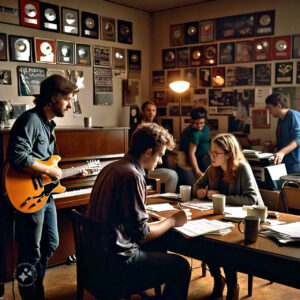Here in this blog post, we are going to tell you 10 Secrets of Successful Songwriters You Need To Know, If you really want to be a successful songwriter, you really need to read and apply this secrete to your songwriting career.
As a singer-songwriter who’s worn many hats in this industry, I’ve seen the magic that happens when raw talent meets hard-won wisdom. Songwriting isn’t just about stringing words and chords together; it’s about tapping into the human experience, crafting melodies that linger, and building a career that thrives.
So, let’s unlock these 10 secrets, each one a stepping stone on your songwriting journey:
1. Develop a Writing Routine: How Consistency Breeds Creativity
2. Find Inspiration in Everyday Life: Turning Experiences into Hits

Remember that feeling of hearing a song for the first time and feeling an instant connection? That’s the power of inspiration, and it’s the lifeblood of any songwriter.
But inspiration isn’t something that just happens. You need to actively seek it out.
- Find Your Niche: What stories are you uniquely qualified to tell? What genre speaks to your soul? Identifying your niche isn’t about limiting yourself; it’s about finding where your voice resonates most strongly.
- Open Your Senses: Inspiration can come from anywhere – a conversation overheard on the subway, a breathtaking sunset, or even a mundane task. Keep your senses open to the world around you.
- Embrace Your Experiences: Your life story is your greatest asset. Tap into your emotions, your triumphs, and even your heartaches to create songs that feel authentic and relatable.
If you feel stuck, try freewriting, brainstorming, or simply spending time in nature. Experiment with different prompts or triggers to spark your creativity. And remember, inspiration is a muscle that needs to be exercised regularly. The more you write, the more easily the ideas will flow.
3. Songwriting 101: Mastering the Fundamentals of Structure & Craft
Every great song, from timeless classics to chart-topping hits, follows a structure. Understanding this structure is like learning the grammar of songwriting. It gives you a framework to build upon, allowing your creativity to flourish within defined boundaries.
- Verse: This is where you set the scene, introduce characters, or explore a concept.
- Chorus: The heart of your song, this is where the main message or hook lives.
- Bridge: A contrasting section that adds a new dimension or perspective.
- Outro: The final statement, often a variation or repetition of the chorus.
Once you understand the basics, you can start experimenting. There are countless variations and possibilities within each section, so don’t be afraid to break the rules and find what works best for you.
Crafting Melodies and Hooks
- Melody: The melody is the tune that people will hum or sing along to. It should be catchy and memorable, complementing your lyrics.
- Hook: This is the most addictive part of your song, the phrase or melody that gets stuck in people’s heads.
Spend time experimenting with different melodies and chord progressions. A strong melody can elevate even the simplest lyrics, and a catchy hook can make your song unforgettable.
Meaningful Lyrics
Your lyrics are the story you’re telling. They should be well-crafted, meaningful, and relatable. Consider these tips:
- Tell a Story: People connect with narratives. Your song can be a mini-story, a personal anecdote, or a reflection on a universal theme.
- Use Vivid Imagery: Paint pictures with your words. Use metaphors, similes, and sensory details to create a rich and evocative experience.
- Be Authentic: Write from the heart. Don’t try to be someone you’re not. Let your unique voice shine through.
By mastering the fundamentals of structure, melody, and lyrics, you’ll create songs that not only sound great but also resonate with your audience on a deeper level.
4. Melody Magic: Crafting Tunes That Stick in Your Head
Think of your favorite songs. What makes them so memorable? Chances are, it’s the melody. A great melody can transport you to another time and place, evoke emotions, and get stuck in your head for days.
The Importance of Melody
- Emotional Connection: Melodies have the power to evoke strong emotions in listeners. A soaring melody can uplift, a melancholic melody can soothe, and a driving melody can energize.
- Memorability: A catchy melody is the key to making your song stick in people’s minds. It’s what they’ll hum along to, sing in the shower, or request on the radio.
- First Impression: Your melody is often the first thing people hear. A strong melody will grab their attention and make them want to listen to more.
Melody Writing Techniques
- Humming and Singing: Sometimes, the simplest way to find a melody is to let it flow naturally. Hum or sing along to your lyrics or a chord progression and see what comes out.
- Playing an Instrument: If you play an instrument, experiment with different chords, scales, and rhythms to discover new melodic ideas.
- Software Tools: There are many software tools available that can help you generate melodies, create chord progressions, and even write entire songs.
- Collaborate: Working with other musicians can be a great way to spark new ideas and expand your melodic vocabulary.
Don’t be afraid to experiment and try new things. The most unexpected combinations can often lead to the most interesting and memorable melodies.
5. Lyricism That Connects: The Art of Storytelling Through Words
Lyrics are the heart and soul of your song. They are what people connect with on a personal level. They tell the story, express the emotions, and leave a lasting impression.
The Power of Storytelling
People are naturally drawn to stories. A well-crafted story can capture their attention, evoke their emotions, and stay with them long after the song is over.
- Universal Themes: Explore themes that resonate with people on a deep level, such as love, loss, hope, or overcoming adversity.
- Personal Anecdotes: Share your own experiences, observations, or reflections. Authenticity can be incredibly powerful.
- Character Development: If your song has a narrative, create relatable characters with unique voices and perspectives.
Figurative Language and Imagery
Figurative language is a powerful tool that can elevate your lyrics from the ordinary to the extraordinary.
- Metaphors and Similes: These comparisons can create vivid imagery and add depth and meaning to your words.
- Personification: Giving human qualities to inanimate objects or abstract concepts can make them more relatable and engaging.
- Symbolism: Using symbols to represent complex ideas or emotions can add layers of meaning to your lyrics.
Remember, your lyrics should be more than just a collection of words. They should be a work of art, a story that unfolds with each verse and chorus, leaving a lasting impression on the listener.
6. Genre-Bending & Experimentation: Breaking Free from the Mold
As a songwriter, it’s easy to get comfortable within a certain genre or style. But some of the most innovative and exciting music comes from artists who aren’t afraid to push boundaries and experiment with new sounds.
The Benefits of Genre-Bending
- Creativity: By blending different genres, you open yourself up to a wider range of musical possibilities. You can experiment with new instruments, rhythms, and production techniques.
- Originality: Genre-bending allows you to create a unique sound that sets you apart from the crowd. It’s a way to forge your own path and express your individuality.
- Audience Appeal: By incorporating elements from different genres, you can attract a wider range of listeners. People who enjoy multiple genres are more likely to discover and connect with your music.
How to Experiment
- Listen Widely: Explore different genres and styles of music. Pay attention to what you like and dislike about each one.
- Collaborate: Working with other musicians who have different backgrounds and influences can be a great way to spark new ideas.
- Don’t Be Afraid to Fail: Experimentation is all about taking risks and trying new things. Not every experiment will be successful, but you’ll learn something valuable from each one.
Remember, genre-bending isn’t about abandoning your roots or trying to be someone you’re not. It’s about expanding your musical horizons and finding new ways to express yourself.
7. Production Techniques for Polished Tracks
In today’s music landscape, the production quality of your songs can be just as important as the songwriting itself. A well-produced track can make your music sound professional, polished, and radio-ready.
Demystifying the Production Process
- Recording: This is where you capture your initial performance, whether it’s vocals, instruments, or both.
- Mixing: This is where you balance the levels of different tracks, add effects, and create a cohesive sound.
- Mastering: This is the final stage where the overall sound of your track is optimized for different playback systems.
Tips for Polished Tracks
- Invest in Quality Equipment: A good microphone, audio interface, and DAW (Digital Audio Workstation) can make a big difference in the sound of your recordings.
- Learn Basic Production Skills: Even if you plan to work with a producer, understanding the basics of recording, mixing, and mastering can help you communicate your vision more effectively.
- Collaborate with a Producer: A skilled producer can bring your songs to life, adding depth, texture, and polish that you may not be able to achieve on your own.
- Pay Attention to Details: Small details like EQ, compression, reverb, and delay can have a big impact on the overall sound of your tracks.
Don’t underestimate the importance of production. A well-produced track can make your songs sound professional, elevate their emotional impact, and help you stand out in a crowded marketplace.
8. Networking & Industry Savvy: Building Relationships That Matter
The music industry is all about relationships. Building a strong network of contacts can open doors, create opportunities, and help you get your music heard by the right people.
Why Networking Matters
- Collaboration: Connecting with other songwriters, producers, and musicians can lead to exciting collaborations and new creative projects.
- Mentorship: Finding experienced mentors can provide valuable guidance and support as you navigate your career.
- Exposure: Networking can help you get your music in front of industry professionals, radio stations, and online publications.
- Support System: Building a community of like-minded creatives can provide a sense of belonging and camaraderie.
How to Network Effectively
- Attend Industry Events: Conferences, workshops, and showcases are great places to meet other professionals and learn about the latest trends.
- Online Communities: Join online forums, groups, and social media communities where you can connect with other songwriters and industry professionals.
- Be Genuine and Authentic: People are more likely to connect with you if you’re genuinely interested in their work and willing to offer your support.
- Follow Up: After meeting someone, send a personalized email or message to thank them for their time and express your interest in staying connected.
Remember, networking is a two-way street. Be willing to offer your support and expertise to others, and you’ll build lasting relationships that can benefit your career for years to come.
9. Resilience & Grit: Overcoming Rejection & Staying True to Your Vision
The music industry can be a tough and competitive place. Rejection is a part of the journey, but it doesn’t have to define your success.
Developing Resilience
- Thick Skin: Learn to accept rejection as a natural part of the process. Don’t take it personally or let it discourage you from pursuing your dreams.
- Focus on Your Goals: Keep your eyes on the prize and don’t get sidetracked by setbacks. Remember why you started writing music in the first place.
- Learn from Your Mistakes: Every rejection is an opportunity to learn and grow. Analyze the feedback you receive and use it to improve your craft.
- Support System: Surround yourself with positive and supportive people who believe in your talent and will encourage you to keep going.
Staying True to Your Vision
- Don’t Compromise Your Integrity: Don’t be afraid to say no to opportunities that don’t align with your values or artistic vision.
- Find Your Tribe: Connect with other musicians who share your passion and values. Together, you can create a community of support and inspiration.
- Celebrate Your Achievements: Take the time to acknowledge and celebrate your successes, no matter how small they may seem.
Remember, the most successful songwriters are those who persevere through the challenges, learn from their mistakes, and never give up on their dreams.
10. Marketing & Promotion: Getting Your Music Heard in the Digital Age
In today’s digital age, there are more opportunities than ever before to get your music heard. But with so much competition, it’s important to have a solid marketing and promotion strategy in place.
Building Your Online Presence
- Website: Create a professional website where you can showcase your music, bio, photos, and upcoming shows.
- Social Media: Utilize platforms like Facebook, Instagram, Twitter, and TikTok to connect with fans, share your music, and build your brand.
- Streaming Platforms: Get your music on platforms like Spotify, Apple Music, and YouTube Music to reach a wider audience.
- Email List: Collect email addresses from fans and send regular newsletters to keep them updated on your latest releases and shows.
Promoting Your Music
- Social Media Ads: Targeted ads can help you reach new listeners who are interested in your genre of music.
- Collaborate with Influencers: Partnering with influencers who have a large following can help you get your music in front of a new audience.
- Submit to Playlists and Blogs: Getting your music featured on popular playlists and blogs can expose your music to a wider audience.
- Play Live Shows: Performing live is a great way to connect with fans and build a following.
Remember, marketing and promotion is an ongoing process. Be patient, persistent, and consistent in your efforts, and you’ll see results over time.
FAQs for Aspiring Songwriters
How do I protect my songs from being stolen?
Copyright your songs as soon as they’re created. Register them with your country’s copyright office for added protection.
How do I get my songs placed in movies or TV shows?
Network with music supervisors, pitch your songs to music libraries, and attend industry events where you can meet people who work in film and TV.
How do I know if my songs are good enough?
Get feedback from trusted sources, like songwriting groups, coaches, or mentors. Be open to constructive criticism and use it to improve your craft.
Should I Sign With a Record Label or Stay Independent?
There are pros and cons to both paths. Weigh your options carefully and consider what’s best for your career goals.
How do I make money as a songwriter?
There are many ways to monetize your music, including royalties from streaming, licensing, live performances, and merchandise sales.
Conclusion
The path to becoming a successful songwriter is a journey, not a destination. It takes dedication, perseverance, and a willingness to learn and grow. But by following these 10 secrets, you’ll be well on your way to achieving your songwriting dreams.
Remember, the most important thing is to enjoy the process. Write from the heart, experiment with new sounds, and connect with other musicians who share your passion.


